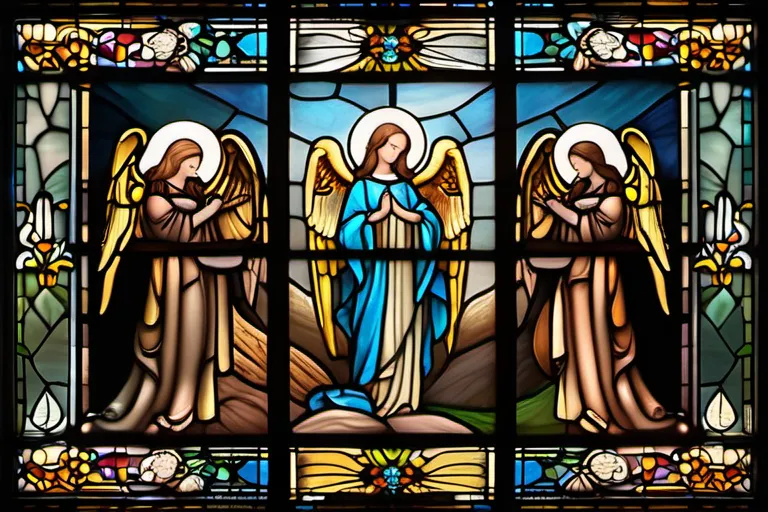Explore the significance, hierarchy, and functions of angels in Christian beliefs.
Delve into the fascinating world of angels and their role in Christianity. From their creation to their hierarchies, discover the various types of angels and their unique functions.
The Creation and Hierarchy of Angels
The creation of angels, according to Christian beliefs, is shrouded in mystery and awe. Imagine the moment when God spoke into existence these celestial beings, each one unique yet part of a grand tapestry woven by divine hand. Could it be that these beings were created purely for their beauty and glory? Or do they serve a more profound purpose? In Christian theology, angels are often depicted as beings of immense power and grace, tasked with duties both great and small.
Understanding the hierarchy of angels is like climbing a mountain; each level offers a unique view. The highest echelons include cherubim, seraphim, and thrones, all radiating divine light and adoration towards God. Are these beings so perfect that they can comprehend the fullness of His wisdom?
Beneath them come principalities and powers, archangels and dominions. Each rank holds a distinct responsibility within the cosmic order. For instance, Michael is often considered the archangel of war and protection, while Gabriel serves as a messenger of God’s will. Do these roles change or evolve over time?
The classes of angels are not just a theological curiosity; they reflect the complexity and diversity within creation itself. Just as humans have different personalities and talents, so too do these spiritual beings possess unique characteristics and functions.
In this hierarchy, each angel has its place, much like a symphony orchestra where every instrument plays a vital role in producing harmony. How do we reconcile the complexity of their roles with our limited understanding?
This exploration into the creation and hierarchy of angels is not just academic; it helps us grasp the vastness of God’s creation and the intricate web of divine providence that encompasses everything from the smallest insect to the mightiest archangel. Are we, as humans, also part of this cosmic order, with our own unique role?
The study of angels in Christianity invites us to ponder the mysteries of our faith and the beauty of God’s creation. Each angel serves a purpose, whether it is guiding, protecting, or delivering messages from heaven.
Angelic Functions: Messengers, Protectors, and Guides
Imagine a world where messengers, protectors, and guides are more than just figments of our imagination but real entities that interact with humanity. In Christianity, angels hold these roles, serving as celestial intermediaries between God and human beings. How do these heavenly beings fulfill their functions? Let’s delve into the multifaceted roles of angels in Christianity.
As messengers, angels are like divine postmen, swiftly delivering God’s words to prophets, kings, and common folk alike. Think of it as an urgent delivery service for the most important messages. The angel Gabriel famously appeared to Mary, announcing the birth of Jesus with a message so significant that it would change history (Luke 1:26-38). But what about other lesser-known instances? How many times have angels whispered guidance or revelation in your life?
Angels also serve as protectors, much like vigilant guardians watching over the innocent. The Bible speaks of how angels protected Daniel from a lion’s mouth (Daniel 6:22) and shielded Moses when he was a baby, floating safely down the Nile in a basket (Exodus 2:3-5). Do you ever wonder if an angel has been by your side, ensuring your safety? In our daily lives, these protectors remind us of God’s constant watchful eye.
Lastly, angels act as guides, leading and directing believers on their spiritual journeys. Just as a lighthouse illuminates the way through darkness, guiding ships safely to harbor, angels lead souls towards salvation and truth. The journey through life can be daunting; imagine having an angel by your side, providing comfort and reassurance whenever you face challenges or uncertainties.
From messengers delivering divine messages, to protectors watching over us, to guides leading the way, angels in Christianity play a crucial role. They are more than just mythical beings; they embody hope, protection, and guidance. Understanding their functions can give us a deeper appreciation of the spiritual world around us.
The Role of Angels in Biblical Events
Imagine stepping into the grand narrative of the Bible, where angels are like messengers from another dimension, whispering divine messages and shaping history itself. In Christianity, the role of angels in significant biblical events is nothing short of miraculous. Consider the Annunciation, when an angel appeared to Mary with a profound message that would change her life forever. How did she receive this word from heaven? Was it as simple and serene as a whispered secret or a thunderous declaration? The answer is somewhere in between—like the gentle rustling of leaves against the solemn silence of night.
The Nativity is another pivotal moment where angels played a starring role. In the midst of a humble stable, an angel appeared to shepherds with joyful news. Imagine the scene: stars shining brightly overhead, and a chorus of celestial beings praising God. It’s almost like a Hollywood special effect, but real. What must those shepherds have felt, standing in awe under that celestial curtain? The angels didn’t just appear; they sang, spreading the message of peace on earth to all who would listen. How did this impact the way people viewed the divine presence and their place within it?
The Ascension of Jesus also involved a significant appearance by angels. As Jesus ascended into heaven, two angels appeared at his side. What was their role in this moment? Were they there to comfort Mary and the disciples or perhaps guide Jesus on his final journey? The Bible tells us that these angels said, “Men of Galilee, why are you staring up into heaven?” It’s a rhetorical question that echoes through the ages, inviting us to ponder our own heavenly aspirations. Angels weren’t just witnesses; they were participants in history, their presence felt even today as we reflect on these events.
These biblical accounts highlight the dynamic and multifaceted role of angels in Christianity. They are not merely passive beings but active participants, guiding and shaping human destiny. Whether it’s a whispered message or a grand heavenly choir, angels remain ever-present, weaving their threads into the intricate tapestry of faith and history.
Angels in Christian Art and Symbolism
How often have you gazed upon those ethereal beings depicted in grandiose Christian art, their wings shimmering like celestial lights? In stained-glass windows, frescoes, and sculptures, angels are not just mere figures; they are profound symbols woven into the fabric of Christian history. Have you ever wondered why these heavenly beings hold such a significant place in religious art?
Angels have long been portrayed as guardians, protectors, and messengers, their roles often intertwined with divine messages and prophetic visions. In stained-glass windows, the purity and brightness of their form are highlighted, symbolizing clarity and enlightenment. Their presence in these intricate artworks serves to remind viewers of the spiritual realm that coexists with our own.
Consider the sandals-shy Michael, depicted in numerous sculptures and paintings. His powerful stance and resolute expression stand as a testament to his role as the Archangel, the leader of God’s host. In frescoes like those by Giotto, Michael is often shown standing over fallen demons, symbolizing triumph over evil and the protection offered to believers.
Frescoes also tell stories of angels guiding saints, such as in the life of St. Peter. Here, an angel appears to him in a vision, leading him out of prison with divine intervention. These depictions remind us that despite our human limitations, there is always hope and help from above.
In sculptures too, angels are portrayed engaging in various tasks. From holding crowns for monarchs to playing musical instruments in heavenly choirs, each role underscores their multifaceted nature as both spiritual beings and messengers of joy and peace.
Angelic Encounters: Stories of Angels in Christianity
Imagine stepping into the realm where heaven meets earth, and the veil between our world and the divine becomes thin. It’s in this mystical space that we find stories of angels, those celestial beings who have played pivotal roles throughout Christian history. One such tale involves St. Michael the Archangel, often depicted as a formidable warrior standing against evil spirits. In early church legends, it is said that during the battle between good and evil, Michael single-handedly protected Jerusalem from invaders. This story serves as a powerful reminder of the strength and protection that angels offer to humanity.
The account of the Three Wise Men also showcases the role of angels in guiding human destiny. These wise men followed a star across vast distances, guided by divine intervention. According to Christian tradition, it was an angel who appeared to them in a dream, directing their path towards Bethlehem. This narrative emphasizes how angels act as messengers and guides, leading believers towards enlightenment and truth. The journey of the Three Wise Men is not just about following a star but also about seeking wisdom and understanding from above.
These stories highlight the multifaceted role of angels in Christianity—guardians, protectors, and divine messengers. They remind us that even today, when we face challenges or seek guidance, angels may be by our side, offering support and direction. Whether it’s through vivid encounters like those of St. Michael or the mysterious journey of the Wise Men, these tales underscore the enduring presence and significance of angels in Christian beliefs.
- How many times have you felt a sense of being watched over or guided by an unseen force?
- Can you recall any instances where your life was subtly altered due to some unexplained guidance?
These questions invite us to reflect on our personal experiences, drawing parallels between ancient stories and modern realities. In doing so, we gain a deeper appreciation for the role of angels in shaping human history and individual destinies.
The Significance of Angels in Modern Christianity
The significance of angels in modern Christianity runs deeper than just ancient tales and religious texts. How often have you found yourself turning to prayer during challenging times, wondering if there’s a divine presence guiding your steps? Are angels merely mythical beings or do they genuinely play a role in our spiritual journeys?
In the Christian faith, angels are not just celestial entities but active participants in God’s plan. They serve as messengers and protectors, much like the guardians we imagine watching over us. Reflect on the story of St. Michael the Archangel, who is said to fight against evil spirits—could there be a more vivid example of their function?
The role of angels extends into our daily lives through meditation. Many believers find solace in contemplating the spiritual guidance provided by angels. Is it possible that these heavenly beings offer comfort and wisdom during moments of reflection? Consider how the Three Wise Men were guided to Jesus, symbolizing the role of angels as guides on our path.
Ancient stories aside, modern Christians continue to find meaning in the presence of angels. They are seen as symbols of hope, protection, and divine intervention. How do you perceive their influence in your life? Are there moments when you feel a presence, a guiding hand that aligns with Christian teachings?
Their functions go beyond mere guardianship; they are also messengers of God’s love and guidance. In the Bible, angels appear to prophets like Isaiah and Daniel, offering insight and prophecy. Could it be that these figures serve as reminders of our own potential for spiritual growth? How might you engage more deeply with this aspect of your faith?
As we explore the role of angels in modern Christianity, let us not dismiss their relevance. They are more than just stories from the past; they are integral to our understanding of divine guidance and support. Could it be that by embracing the concept of angels, we find greater meaning and purpose in our spiritual lives?
Conclusion
 Gain a deeper understanding of angels and their importance in Christian theology. Learn how they serve as messengers, protectors, and guides for humanity.
Gain a deeper understanding of angels and their importance in Christian theology. Learn how they serve as messengers, protectors, and guides for humanity.











